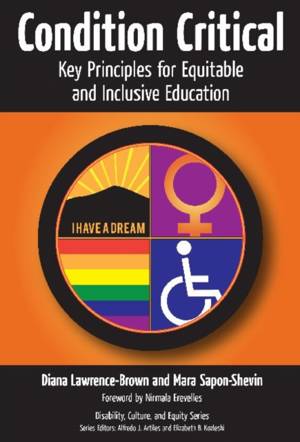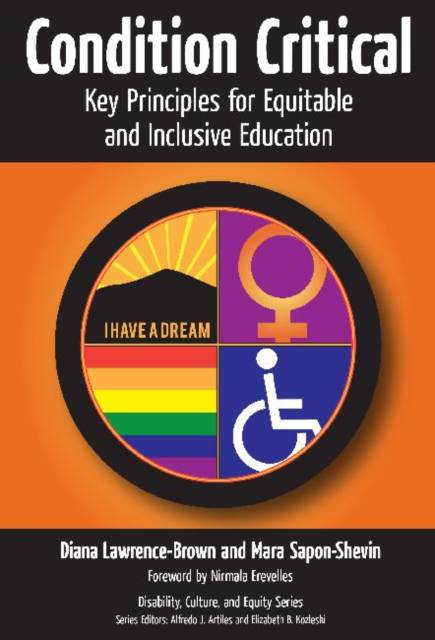
- Retrait gratuit dans votre magasin Club
- 7.000.000 titres dans notre catalogue
- Payer en toute sécurité
- Toujours un magasin près de chez vous
- Retrait gratuit dans votre magasin Club
- 7.000.0000 titres dans notre catalogue
- Payer en toute sécurité
- Toujours un magasin près de chez vous
Condition Critical--Key Principles for Equitable and Inclusive Education
Diana Lawrence-Brown, Mara Sapon-ShevinDescription
This important book provides a unique merging of disability studies, critical multiculturalism, and social justice advocacy to develop both the knowledge base and the essential insights for implementing fully inclusive education. The authors expand the definition of inclusion to include students with a broad range of traditionally marginalized differences (including but not limited to disabilities, cultural/linguistic/racial background, gender, sexual orientation, religion, and class). Chapters provide 12 key principles important to developing a critical perspective toward educating diverse students.
Book Features:
- Personal stories that make concepts accessible to new and pre-service teachers.
- Application exercises ideal for courses and professional development workshops.
- Highlight boxes that raise additional questions for discussion and debate.
- Interactive, multimodal instructional activities to use with many kinds of learners.
- Additional activities and resources available online at www.tcpress.com.
Introduction: Critical Pedagogies, Inclusive Schooling, and Social Justice
Diana Lawrence-Brown
Part I. Understanding and Envisioning Inclusive Education
1.;How We Respond to Differences--And The Difference it Makes
Mara Sapon-Shevin
2.;Understanding Critical Perspectives--Who Benefits?
Diana Lawrence-Brown
3.;Multiple Identities, Shifting Landscapes
Janet Sauer
4.;The Social Construction of Difference
Graciela Slesaransky-Poe and Ana Maria García
5.;Same Struggle, Different Difference: Linking Liberation Movements
Mara Sapon-Shevin
6.;Evaluating Assumptions; Examining Evidence
Diana Lawrence-Brown
Part II: Enacting Inclusive Education
7.;Building Inclusive Communities
Stacey N. Skoning & Kathryn Henn-Reinke
8.;The Art of Inclusive Teaching:
Developing a Palette to Reach All Learners
David J. Connor & Subini A. Annamma
9.;Considering Behavior as Meaningful Communication
Robin M. Smith
10.;We Are What We Assess:
How Schools Construct and Shape Identity and Performance
Elizabeth B. Kozleski & Laura Atkinson
11.;Fostering Self-Determination Through Culturally Responsive Teaching
JoDell Heroux, Susan Peters, & Maryl Randel
12.;Advocating for Successful School Change
Valerie Owen, Kathleen Kotel, Julie Ramirez, Virginia Zeitlin, Elizabeth Dejewski, & David Feingold
Conclusion: Examining Perspectives on Inclusive Education
Diana Lawrence-Brown & Mara Sapon-Shevin
Spécifications
Parties prenantes
- Auteur(s) :
- Editeur:
Contenu
- Nombre de pages :
- 256
- Langue:
- Anglais
- Collection :
Caractéristiques
- EAN:
- 9780807754764
- Date de parution :
- 05-12-13
- Format:
- Livre broché
- Format numérique:
- Trade paperback (VS)
- Dimensions :
- 156 mm x 229 mm
- Poids :
- 349 g

Les avis
Nous publions uniquement les avis qui respectent les conditions requises. Consultez nos conditions pour les avis.






